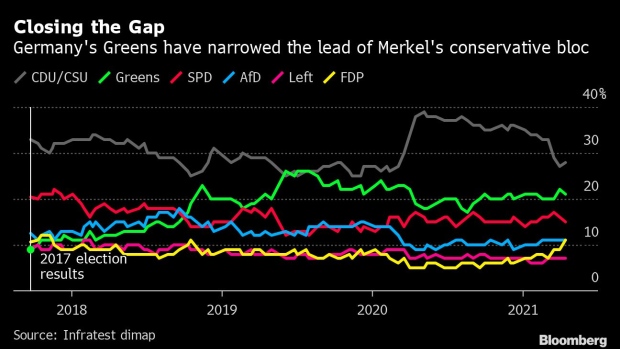Apr 19, 2021
German Greens Bet on 40-Year-Old Woman to Grab Merkel’s Job
, Bloomberg News

(Bloomberg) -- Angela Merkel’s successor could end up being Germany’s youngest-ever chancellor after the Greens proposed Annalena Baerbock as their candidate for chancellor in September’s election.
The 40-year-old political scientist and foreign-policy expert, who like Merkel represents a constituency in the former communist East, won out Monday over fellow Greens co-leader Robert Habeck.
“Today, we start a new chapter for our party, and if we do this well, also for our country,” said Baerbock. “I stand for renewal. Others represent the status quo.”
The nomination makes Baerbock the top rival for Merkel’s conservatives, which is yet to choose its own candidate amid a tense power struggle between the two party’s in their alliance.
In contrast to the acrimonious and drawn-out battle for the conservative chancellor candidacy, the process for the Greens was orderly. The timing of the announcement was flagged well in advance and agreed without public tension.
“Annalena Baerbock is a focused and strong-willed woman who knows what she wants,” Habeck said at the presentation of the party’s first official chancellor candidate.
Baerbock, a lawmaker from Brandenburg, became joint party leader in January 2018. By appealing to city voters with a pragmatic approach to fighting climate change, she’s helped guide the Greens -- a distant sixth place in the 2017 election -- to within touching distance of the Christian Democrat-led alliance.
“Like no other party, the Greens embody Germany’s urban Zeitgeist,” said Holger Schmieding, chief economist at Berenberg bank. Climate change is a major concern not just for the young generation but for all Germans, he said, pegging the chances of a Green-led government at 35%.
The Greens stand to play a key role in Germany’s next administration, and Baerbock could even become the country’s second female chancellor if results go her way. But even with Merkel’s CDU/CSU bloc struggling, the likeliest outcome is a junior role in a conservative-led government, according to the latest polls.
While Habeck has typically had a slightly higher approval rating, Baerbock has recently caught up and is seen as having a firmer grasp of policy and is well-respected in the party’s parliamentary caucus. She becomes the only woman in the chancellor race after a rapid rise from a back-room functionary who failed to get elected in 2009.
Recent wins in regional elections in Rhineland-Palatine and in Baden-Wuerttemberg -- where their candidate was elected to a third term as state premier -- have given the Greens additional momentum. They have only governed at federal level once before -- as junior partners under Gerhard Schroeder of the Social Democrats -- but are now part of 11 regional governments.
A former competitive trampolinist, Baerbock studied international law at the London School of Economics and political science and public law in Hamburg. While she’s from the party’s moderate wing -- a so-called “realo” -- the campaign program bears signs of its more radical roots.
The platform calls for changing the mandate of the European Central Bank to promote jobs rather than just maintaining price stability.
The cornerstone of the party’s campaign involves a plan to invest 50 billion euros ($60 billion) a year in a digital, environmental transformation of Europe’s largest economy.
They would fund the spending -- equivalent to an annual boost of about 1.5% to national output -- with steeper taxes on the wealthy and higher costs for polluting.
One of the most controversial policies could be plans to reform Germany’s constitutional debt limits. The proposal calls for investment to be treated as public assets, allowing the state to take on more debt and take advantage of low interest rates.
(Updates with comments from Baerbock in third paragraph)
©2021 Bloomberg L.P.







